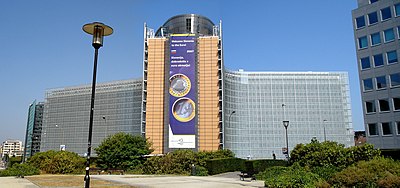
Back قانون الاتحاد الأوروبي للمنافسة Arabic Dret de la competència europeu Catalan Evropské právo hospodářské soutěže Czech Wettbewerbsrecht (Europäische Union) German Derecho de la competencia (UE) Spanish قانون رقابت اتحادیه اروپا Persian Droit de la concurrence (Union européenne) French Hukum kompetisi Uni Eropa ID 欧州連合競争法 Japanese 유럽 연합 경쟁법 Korean
This article needs additional citations for verification. (April 2015) |
| This article is part of a series on |
 |
|---|
|
|

In the European Union, competition law promotes the maintenance of competition within the European Single Market by regulating anti-competitive conduct by companies to ensure that they do not create cartels and monopolies that would damage the interests of society.
European competition law today derives mostly from articles 101 to 109 of the Treaty on the Functioning of the European Union (TFEU), as well as a series of Regulations and Directives. Four main policy areas include:
- Cartels, or control of collusion and other anti-competitive practices, under article 101 TFEU.
- Market dominance, or preventing the abuse of firms' dominant market positions under article 102 TFEU.
- Mergers, control of proposed mergers, acquisitions and joint ventures involving companies that have a certain, defined amount of turnover in the EU, according to the European Union merger law.[1]
- State aid, control of direct and indirect aid given by Member States of the European Union to companies under TFEU article 107.
Primary authority for applying competition law within the European Union rests with the European Commission and its Directorate-General for Competition, although state aids in some sectors, such as agriculture, are handled by other Directorates-General. The Directorates can mandate that improperly-given state aid be repaid, as was the case in 2012 with Malev Hungarian Airlines.[2]
Leading ECJ cases on competition law include Consten & Grundig v Commission and United Brands v Commission. See also List of European Court of Justice rulings#Competition for other cases.
- ^ "EUR-Lex – 32004R0139 – EN – EUR-Lex". eur-lex.europa.eu. Retrieved 18 July 2018.
- ^ "Terms of Service Violation". Bloomberg Businessweek. Archived from the original on 12 January 2012. Retrieved 18 July 2018.



